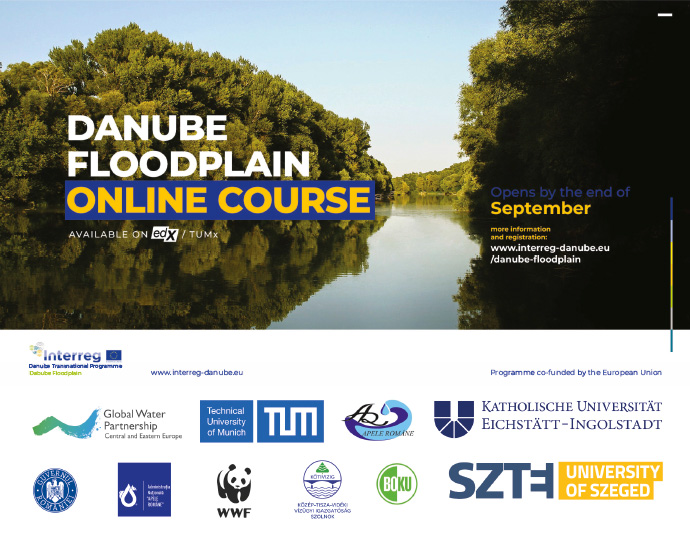Danube Watch 1/2021 - Join the Danube Floodplain Online Course
Join the Danube Floodplain Online Course
100% free and accessible to everyone, a new Danube Floodplain Online Course is an incredible opportunity to help you better understand the concept of Floodplain Management, show you examples of floodplain restoration measures, and explain how to apply tools and knowledge developed by the project itself.

Contribution to better floodplain management
Throughout history, floodplains have been a vital part of landscapes where different land management was harmonized with regular flooding. With growing land use intensification, floodplains have diminished, been drained, settled on, or even replaced with heavily polluting factories. On top of this, an already precarious situation is exacerbated by building infrastructure to prevent overflooding. The risk of flooding has become a serious hazard with the potential to cause loss of property – and even human casualties. Both aspects are increasing under climate change.
On the other hand, according to recent management and scientific evidence, bringing rivers to their natural pattern of flooding is in fact one of the best possible solutions to help tackle the multiple water, drought, biodiversity and land management related challenges of our time.
The Danube Floodplain project is focusing on showing how this is possible, with its brand-new online course. It is designed to help explain how flood mitigation and floodplain restoration are compatible, and how we can manage floodplains to preserve habitats and improve ecosystems using cross-cutting management tools developed for the Danube region, and applicable across its boundaries. The course will tackle the historical floodplain loss, current flood risk, and applicable case studies during which we’ll discuss a variety of such win-win measures.
The Danube Floodplain Online Course is the first course offered on edX by an EU Interreg project and offers dynamic and engaging lectures that will increase your understanding of approaches to floodplain management.
With this course, our project partners want to address junior and mid-level professionals from local, regional, or national water authorities in the area of disaster risk reduction; SMEs focused on floods; professionals from the water management sector; and students – the managers of the future. Everyone and anyone interested in developing their competences in floodplain management is warmly invited to join.
Course logistics and requirements
The course launches end of September 2021. Participants can start and complete the course materials at their own pace, but no later than the end of 2021.
The course will be linked with the Danube Floodplain Winter Online School (planned in November), where participants can deepen their knowledge under the supervision of lecturers.
Structure
The content remains accessible for the duration of the course, consisting of an introductory module plus six content modules.

What you will learn
After the course, you will be able to:
- explain the concept of floodplain management approach
- understand application of measures for floodplain restoration from multiple perspectives
- distinguish practical examples where the Danube Floodplain Tools can be applied to support floodplain management
- Introductory Module: you will get to know the challenges and importance of floodplain management.
- Module 1: will give you a better understanding of flood risk management and different policy frameworks influencing flood management.
- Module 2: you will learn about the practical examples of the win-win measures.
- Module 3: goes deeper into the technical aspects of floodplain restoration. Concepts of hydrology and hydraulics theory of habitat modelling, importance of riparian vegetation and ecosystem services will be explained.
- Module 4: focuses on the restoration planning and decision-making aspects of floodplain management.
- Module 5: provides an overview of the principles and objectives of Floodplain Management and a method for floodplain evaluation, the so-called Floodplain Evaluation Matrix (FEM). It also introduces Floodplain GIS.
The course includes reading materials to supplement the lectures and different engaging assignments and progress check questions throughout.







